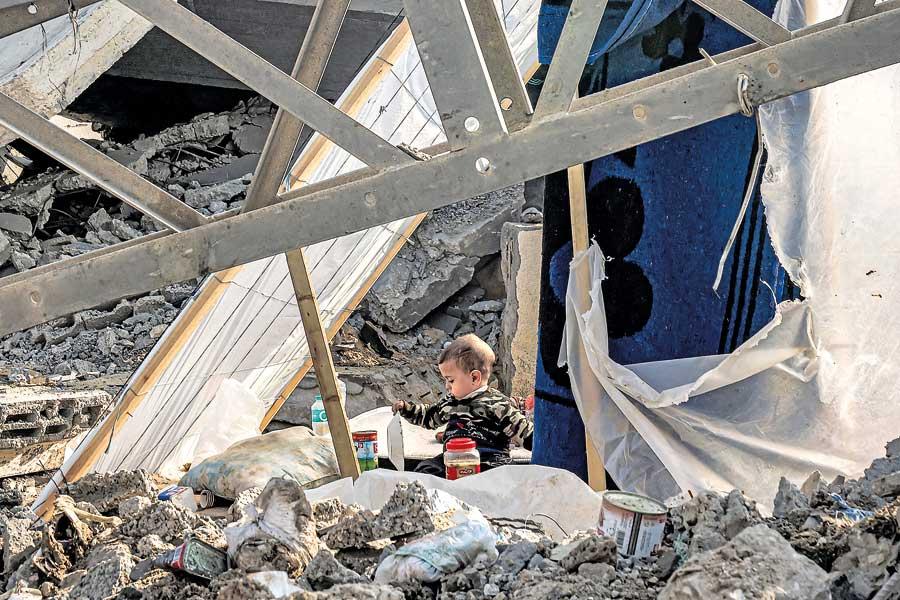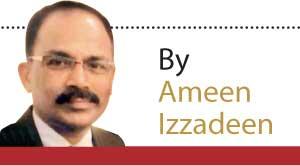05 Jan 2024 - {{hitsCtrl.values.hits}}

A child holds a plate while sitting amid rubble in Rafah in the southern Gaza Strip amid the ongoing conflict between Israel and the Palestinian militant group Hamas. AFP
The Cold War had just ended, and the bipolar global order had given way to a unipolar order led by the United States. The euphoria in the West after its victory over the Soviet Union and its communist bloc was met by hopes springing from newly emerged democracies in Eastern Europe and the Non-Aligned Movement (NAM), which had lost its raison d’être. The hope was that the US would lead by example and ensure a rule-based world order where human rights would be upheld and social and economic justice would prevail.
States. The euphoria in the West after its victory over the Soviet Union and its communist bloc was met by hopes springing from newly emerged democracies in Eastern Europe and the Non-Aligned Movement (NAM), which had lost its raison d’être. The hope was that the US would lead by example and ensure a rule-based world order where human rights would be upheld and social and economic justice would prevail.
Against this backdrop, on December 16, 1991, the United Nations General Assembly was convened at the behest of the United States, the sole superpower, whom most nations decided to support in anticipation that it would exercise its unchallenged power with responsibility and for the well-being of the global community—to end conflicts, alleviate poverty, and establish justice. The UN met to nullify the 1975 UN General Assembly Resolution 3379 that equated Zionism with racism.
Resolution 3379 drew its strength from previous UN resolutions and declarations, including the United Nations Declaration on the Elimination of All Forms of Racial Discrimination. Among other points, it noted a declaration Non-Aligned Countries Foreign Affairs Ministers adopted in Lima in August 1975, most severely condemning Zionism as a threat to world peace and security and calling upon all countries to oppose this racist and imperialist ideology. The resolution declared that “Zionism is a form of racism and racial discrimination.”
Zionism is Israel’s state policy, and it seeks to establish a Jewish state in what was Biblical Israel—from the Nile in Egypt to the Euphrates in Iraq, encompassing Palestine, Syria, Lebanon, Jordan, parts of Egypt, northern Saudi Arabia, and a portion of Iraq. Austrian journalist Theodor Herzl, who was regarded as the father of Zionism, explained the concept in his book The Jewish State in 1896. It won wide acceptance at the first congress of the World Zionist Organisation in Basle (Switzerland) in 1897. Since then, the movement has achieved what it wanted through intrigues, shenanigans, treachery, terrorism, and the hijacking of Judaism. Zionism even played decisive, behind-the-scenes, game-changing roles in the two world wars.
When the US-sponsored Resolution 46/86 was presented in 1991, most NAM states, in deference to the sole superpower, voted for it or abstained. After all, the 1975 resolution (3379) was spearheaded by mostly NAM nations. Most Arab and Islamic countries voted against the resolution, arguing that Israel was continuing its atrocities against the Palestinians in occupied territories. Joining the Arab and Islamic countries were four other non-Muslim nations: Sri Lanka, North Korea, Cuba, and Vietnam.
Sri Lanka took the moral high ground in support of the Palestinians’ right to statehood and freedom and insisted that Zionism was indeed a form of racism. Despite Sri Lanka’s ‘no’ vote, Resolution 46/86 was passed, enabling Israel, a pariah for NAM till then, to make its diplomatic presence felt in many African and Asian nations. But many of them were soon to learn that Israel’s atrocities only became worse in the Palestinian territories.
Sri Lanka’s president at the time was Ranasinghe Premadasa. One of his presidential election pledges in 1988 was to sever relations with Israel. His predecessor, President J. R. Jayewardene, had established limited ties with Israel and opened an Israeli liaison office in the US embassy, largely to facilitate military supplies from the Zionist state. This was after Washington said it could supply weapons to Sri Lanka only with India’s consent, which was then unthinkable given New Delhi’s open support for Sri Lanka’s separatist rebels. Sri Lanka was to later learn that the Israelis were not only training Sri Lankan troops but also the separatist Liberation Tigers of Tamil Eelam (LTTE), as revealed by Victor Ostrovsky, a former Mossad officer, in his 1991 bestseller ‘By Way of Deception.’
The Premadasa government’s decision was a continuation of the post-independence foreign policy that had a moral compass, although some may claim it was all about winning Muslim votes and wooing the Arab world for aid. Even the Jayewardene government had a principled foreign policy concerning Israel, though the civil war in 1983 pushed it to maintain military ties with the Zionist entity. In 1979, when Sri Lanka was billed to play a cricket match against Israel at the International Cricket Council’s Associate Members tournament to qualify for the World Cup, the Jayewardene government advised the Sri Lanka cricket team to skip the match.
But today, Sri Lanka is playing Dr. Jekyll and Mr. Hyde in foreign policy-making vis-à-vis Israel. It votes for UN resolutions calling for an immediate ceasefire in Gaza, but at the same time sends thousands of Sri Lankan workers to support Israel’s war economy. It should be noted here that with regard to Apartheid South Africa, Sri Lanka strictly implemented the 1977 Gleneagles Agreement, according to which Commonwealth nations were required to sever sporting ties with the white supremacist regime.
Just as it was morally incorrect to have any ties with Apartheid South Africa, it is with apartheid Israel. Would we have sent tea donations to Rwanda when the Hutus were massacring the Tutsis in 1914 or to the Serbian ultranationalists when they were committing genocide against Bosnians in 1995? If we had a government of our own during World War II, would we have sent labourers to Nazi Germany to help it meet the labour shortage created by the extermination of the Jews?
The decision to send Sri Lankan workers to Israel was morally reprehensible. It helps Israel’s genocide. Sri Lankan agri-workers take the place of Israeli farmers, who join the army and kill Palestinian babies in Gaza. Going after a few shekels while trashing principles is akin to selling Lanka’s collective soul.
In contrast, South Africa stands tall in world politics. It has brought Israel before the International Court of Justice for a ruling that what Israel is doing in Gaza is genocide and a crime against humanity. If there is a global morality index, South Africa would certainly be at the top. Sri Lanka, with its Dr. Jekyll and Mr. Hyde foreign policy, is somewhere in the middle, and the bottom-ranking nation will be the morally bankrupt United States of America together with Israel.
And now Sri Lanka wants to send a naval ship to the Red Sea to protect merchant ships from Yemen’s Houthi forces, who are doing their part to stop the genocide in Gaza. The Houthis are largely targeting vessels going to and coming from Israel or owned by Israel. By confronting the Houthis, isn’t the government extending tacit support to Israeli genocide or expressing solidarity with the pro-Israeli Western alliance that is now policing the Red Sea at a time when the conflict in Gaza is threatening to spread region-wide?
Playing Dr. Jekyll and Mr. Hyde as regards the Israeli-Palestinian issue is nothing new. In 2006, on the instruction of the foreign ministry, Sri Lanka’s envoy gave a slip during a crucial UN vote to condemn Israel’s atrocities in occupied Palestine. The Sunday Times aptly headlined the story, “Flushing the Palestinian cause down the UN toilet,” as Sri Lanka’s envoy was said to have left the chamber to answer the call of nature.
25 Nov 2024 46 minute ago
25 Nov 2024 1 hours ago
25 Nov 2024 1 hours ago
25 Nov 2024 2 hours ago
25 Nov 2024 2 hours ago